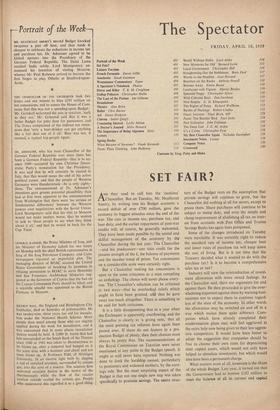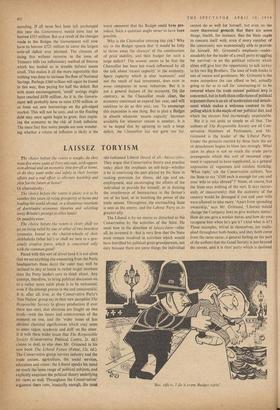SET FAIR?
AND they used to call him the 'cautious' ..,M.Chancellor. But on Tuesday, Mr. Heathcoat Amory, by writing into his Budget accounts a record deficit of over £700 million, gave the economy its biggest stimulus since the end of the war. The cuts in income tax, purchase tax, and beer duty; and the earlier repayments of post-war credits will, of course, be generally welcomed. They have been made possible by the sound and skilful management of the economy by the Chancellor during the last year. The Chancellor —and his predecessor—can take credit for the present strength of the £, the balance of payments and the steadier trend of prices. Tax concessions on a considerable scale were certainly right.
But a Chancellor making tax concessions is open to the same criticisms as a man compiling an anthology. The choice will never please every- one. The Chancellor's selection can be criticised in two ways—that he overlooked reliefs which ought to have been granted, and that he gave away too much altogether. There is something to be said for both criticisms.
It is a little disappointing that• in a year when the Exchequer is apparently overflowing, and the Chancellor is clearly in 'a giving vein,' that all the most pressing tax reforms have again been passed over. If these do not feature in a pre- election Budget of plenty, then their chances must always be pretty thin. The recommendations of the Royal, Commission on TaxatiOn were never mentioned at any point in the Budget speech. It might as well never have reported. Nothing was done to limit the hardship caused, particularly to pensioners and widowed mothers, by the earn- ings rule. But the most surprising aspect of the Budget is that not one single new step was taken specifically to promote savings. The entire struc-
ture of the Budget rests on the assumption that private savings will continue to grow, but the Chancellor did nothing at all for sayers, except to praise them. Share purchases will continue to be subject to stamp duty, and even the simple and cheap improvement of abolishing all tax on inter- est from accounts with Post Office and Trustee Savings Banks has again been postponed.
Some of the changes introduced on Tuesday were inevitable. It was certainly right to reduce the standard rate of income tax; cheaper beer and lower rates of purchase tax will keep down the cost of living. But is it not time that the Treasury decided what it wanted to do with the purchase tax? Is it to become a comprehensive sales tax or not?
Industry will view the reintroduction of invest- ment allowances with more mixed feelings. As the Chancellor said, there are arguments for and against them. He then proceeded to give the over- whelming argument against them by warning busi- nessmen not to expect them to .continue regard- less of the state of the economy. In other words the allowances may be switched on and off in a way which makes them quite arbitrary. Com- panies which have already completed their modernisation plans may well feel aggrieved at the extra help now being given to their less aggres- sive competitors. It would have been better to adopt the suggestion that companies should be free to choose their own rates for depreciating their capital assets, which would not only have helped to stimulate investment, but which would also have been a permanent charge.
What matters most of all, howevent is the shape of the whole Budget. Last year, it turned out that the Government had to borrow £182 million to meet the balance of all its current and capital
spending. if all taxes had been left unchanged this year the Government would have had to borrow £355 million. But as a result of the changes made in the Budget the Government will now have to borrow £721 million to cover the largest over-all deficit ever planned. The chances of doing this without recourse to the issue of Treasury bills (an inflationary method of finance which has landed us in trouble before) seems small. This makes it all the more regrettable that nothing was done to increase the flow of National Savings. Perhaps £360 million will again be found in this way, thus paying for half the deficit. But with more encouragement, 'small' savings might have reached £450 million. As it is, the Govern- ment will probably have to raise £350 million or so from net new borrowings on the gilt-edged market. This will not be easy, and so the floating debt may once again begin to grow, thus expos- ing the economy to the risk of fresh inflation. The mere fact that many people are now wonder- ing whether a return of inflation is likely is the worst comment that the Budget could have pro- voked. Such a question ought never to have been possible.
Why is the Chancellor running this risk? Why say in the Budget speech that 'it would be folly to throw away the chances' of the continuation of price stability, and then budget for such a large deficit? The answer seems to be that the Chancellor has been too much influenced by all the talk about 'excess capacity' in the economy. Spare capacity which is also 'economic' and not the result of bad investment, does exist in some companies in some industries. But it is not a general feature of the economy. On the contrary, as the Chancellor made clear, the economy continued to expand last year, and will continue to do so this year, too. To encourage this expansion is one thing. But to plan a Budget to absorb whatever 'excess capacity' becomes available for whatever reason is another. It is to be hoped that by agreeing to such a large deficit, the Chancellor has not gone too far.















































 Previous page
Previous page